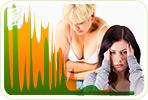
Was that a hot flash? When exactly was my last period? What is happening to my libido? Is this the beginning of menopause? Women between their 40s and 50s may ponder these matters and thousands more as they approach menopause, a transition that usually takes place around the age of 50.
Read on to discover the most common symptoms of menopause, as well as descriptions of each that will help you identify these symptoms.
Hot Flashes and Night Sweats
Hot flashes and their nocturnal counterparts, night sweats, are sudden bursts of heat that radiate throughout a woman's head, neck, and chest for up to 30 seconds. Women who experience menopause-related hot flashes and night sweats report symptoms such as:

- Mild cranial pressure
- Slight nausea
- Flushed skin
- Perspiration
- Damp bed sheets
- Rapid heartbeat
- Chills
Menopausal hot flashes can occur multiple times per day, so women who are between the ages of 40 and 50 and experience the above symptoms fairly frequently are most likely entering their menopausal years.
Irregular Periods
Irregular periods are one of the tell-tale symptoms of menopause and are characterized by missed, infrequent, or too frequent menstrual periods. Other factors that might cause irregular periods include pregnancy, excessive exercise, poor nutrition, and certain gynecological complications. Women who know that they are not pregnant, don't exercise excessively, receive adequate nutrition, and have been screened for other gynecological problems are most likely beginning to go through menopause.
Loss of Libido
Loss of libido is a disinterest in sexual activity that can be caused by a number of other factors besides menopause. Stress, anxiety, prolonged illness, and other emotional and psychological factors can lead to a loss of libido. However, women who have not experienced any of these issues are most likely entering menopause.
Vaginal dryness
Vaginal dryness,this symptom occurs when the vagina fails to produce enough natural lubrication, making sexual activity uncomfortable and painful, and the vagina itchy.

It might also be caused, however, by recent childbirth, breastfeeding, and certain medical conditions like Sjögren's syndrome. If vaginal dryness is not caused by one of these things, it is most likely related to the hormonal fluctuations associated with symptoms of menopause.
More Information about Symptoms of Menopause
Deciphering information about menopause and its symptoms - not to mention preparing to go through this transition - can be a daunting challenge, but women armed with information about the symptoms of menopause will be better equipped to navigate their menopausal transition.
For further information on how to manage menopausal symptoms, explore the articles below.
Sources
- BMJ Group. "Menopause: What is it?" Patient Leaflet. 2007.
- Hopkins, Virginia. Lee, John R. M.D. What Your Doctor May Not Tell You About Menopause. New York: Warner Books Inc., 1996.
- Love, Susan M.D. Menopause and Hormone Book. New York: Three Rivers Press, 2003.
- Martin, Raquel. The Estrogen Alternative. Rochester, VT: Healing Arts Press, 2000.


